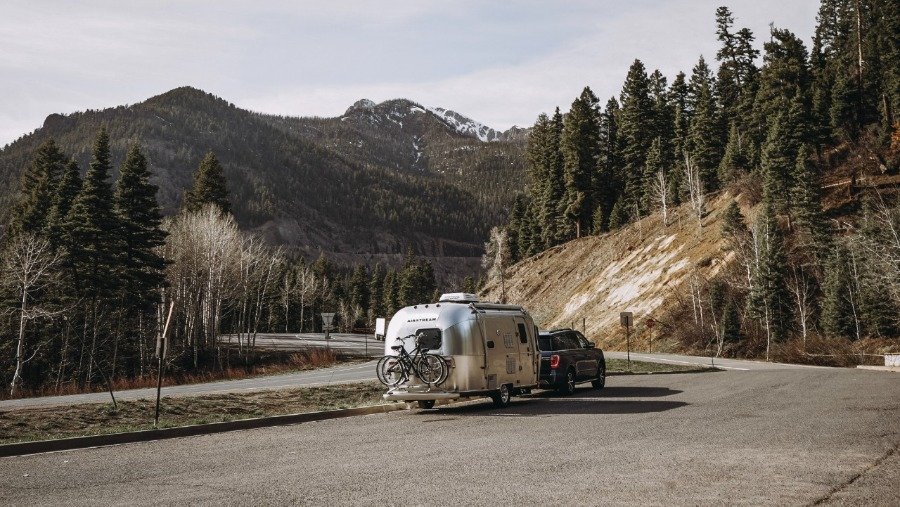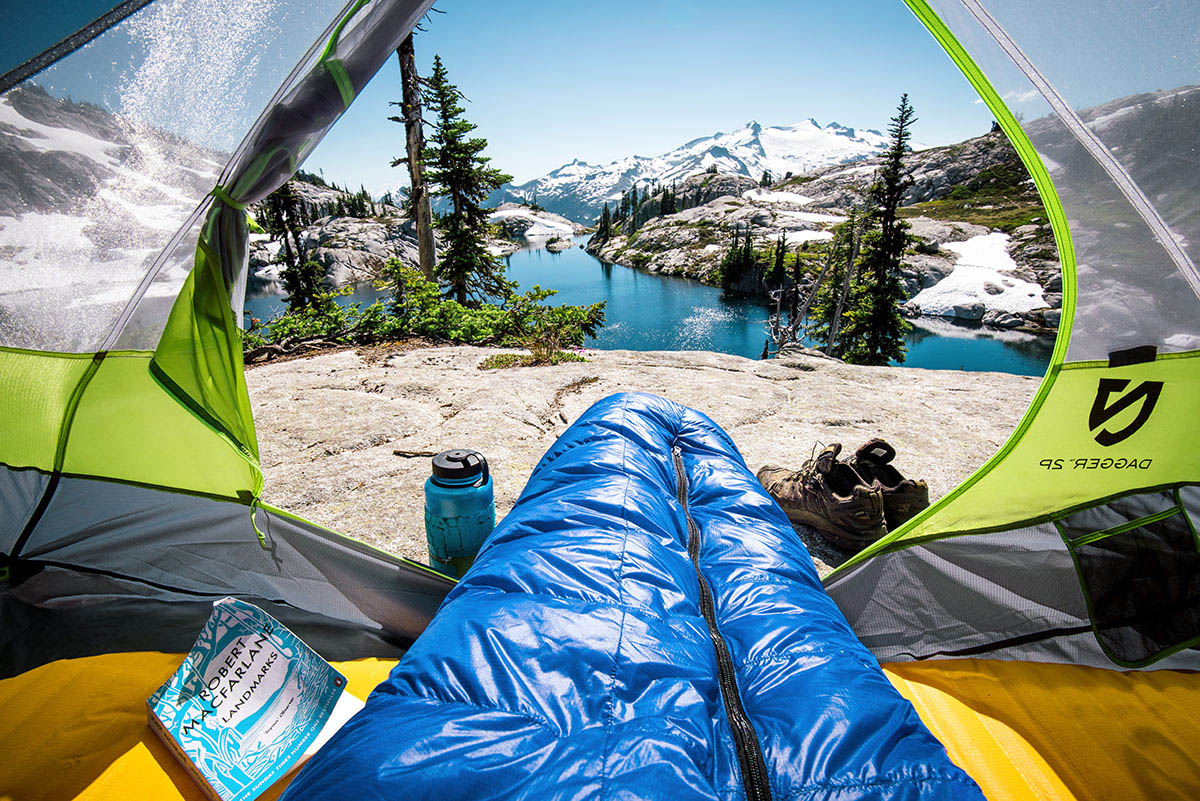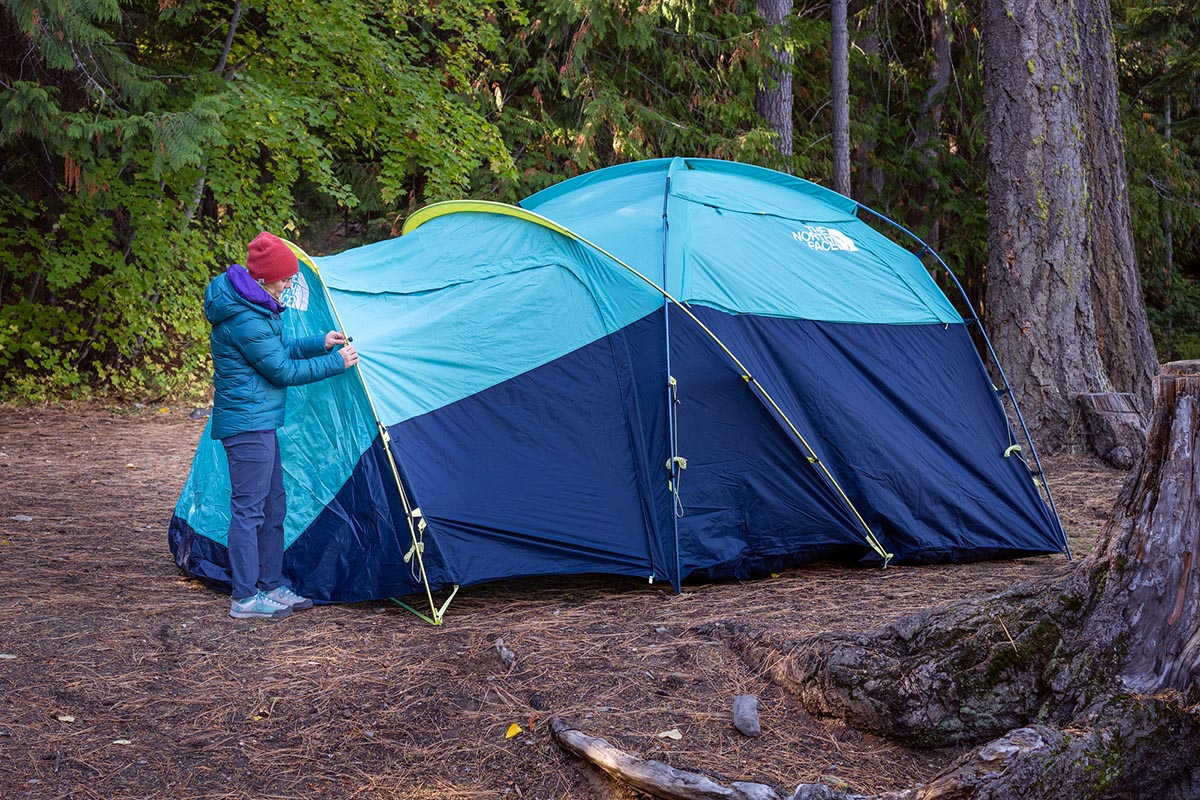#VanLife Too Cramped? Try A School Bus
Recently, our editor left on a mysterious mission to bring back ‘a big surprise.’ He wasn’t joking: That surprise was a 38-foot, 11-ton mobile-living monster RV camper.

My wife and I landed in Bozeman, Mont., on a secret mission. My friends and co-workers had no idea where we were or why we left our Minneapolis home unannounced.
In truth, our arrival was the culmination of more than two years of searching, planning, and preparing. My wife, Kallie, and I spent the better part of our young married lives searching for a perfect “Van Life” home-on-wheels. It had to check all the boxes: Something that felt like a home, had a bathroom and shower, could go off-grid, and had enough space to move around and store some serious gear.

In short, part tiny home, part mobile office, and part equipment garage.
Supposedly, that very thing was available in Bozeman, waiting for us. Once there, we threw our spent one-way plane tickets in the garbage and set off on the objective: To find our ride home.
Check out the video tour below.
The ‘Emerald Mile Bus’
Our new home is an unconventional adventuremobile, to put it lightly: A GMC 54-passenger Blue Bird school bus that, with some custom modifications, is now an RV.

The previous owners purchased the bus in California for $5,500 plus $1,000 in repairs, then spent six months converting it, and living in it for a few summers. They were now looking to pass it on to a travel-hungry couple.
We emailed the owners, told them we were that couple, and bought the 38-foot behemoth (which we recently named ‘Emerald Mile Bus’ or ‘Emmy’) one month later. #YOLO!

Not Your Typical School Bus Amenities
Push open the door, switch on the lights, and walk on up. The driving area is what you’d find in any old school bus: Large, bouncy driver’s seat, a switchboard of lights, oversized steering wheel, and plenty of viewing space.

Looking toward the back of the bus, a nice 7-foot L-shaped couch (with underside storage) provides seating for passengers and doubles as an extra bed. A folding dinette Velcros down while driving and swings up for two to dine.

Further back, two desk areas have computer monitor mounts, 110v charging ports, and drawers. With the bus’s WiFi Ranger system, it’s an internet-marauding mobile office.

Opposite the desk area, there’s a butcher-block kitchen counter top, four cabinets, a two-way propane-electric refrigerator, two-burner propane stove, stainless steel sink, and a 14” Fantastic Fan above that spins air in or out. There’s literally more counter space than we currently have in our 720 square-foot apartment.

Near the back, the bathroom hosts a Nature’s Head composting toilet and a sizeable shower. The toilet uses peat moss and a tilling mechanism to break down solid waste, while liquids head into a separate compartment. A small fan directs any smell outside the vehicle.

The “bedroom” sits at the far back, with a full-size bed (atop a large storage hatch underneath), a couple of shelves for books, and two light sconces that provide nice reading light.

From the outside, the backdoor opens to reveal a massive gear shed. This is great because it’s separate from the rest of the bus, so no stinky shoes or wet tents seep into the main cabin.
This was the biggest selling point for us. We can fit two full-sized bikes, crash pads, skis, camping gear, backpacks, and more.
School Bus RV Conversion: Power, Heat, Water
Three 160-watt solar panels, a 3,000-watt pure sine inverter, and four 125-amp-hour AGM batteries provide electricity. All interior lights and small fans run on 12v power and are always accessible, while all electrical outlets (for charging devices) are 110v and require the inverter to be switched on. Additionally, if weeks go by without sun, the bus can be hooked up to shore power to recharge the batteries.
A 28-gallon externally mounted propane tank provides furnace heat (vented throughout the vehicle), stove use, and hot water. With normal use, the tank lasts about 1-2 months and can be refilled at most gas stations.

The freshwater and gray water tanks mount under the bus and each hold 65 gallons. And it has a 6-gallon water heater. Translation: There’s ample water to shower and do dishes with for 10+ days. We can refill at any spigot.
The main downside: There’s no A/C, so we’ll need to stay hydrated on summer drives!
Emerald Mile Bus Specs
- Vehicle: 2001 GMC Blue Bird Conventional, B-Series chassis
- 111,000 miles
- Fuel Economy: 7-8 mpg
- Outside Dimensions: 38’ x 8’ x 10’6”
- Interior Space: 218 sq. ft. w/ 6’2″ headroom
- Power: Solar, electric
- Sleeps: 2-4, full-size bed + ‘twin-size’ couch
- Shower: Yes, 6-gal heater
- Toilet: Compost
- Water: Two 65-gal water tanks for freshwater and gray water
- Heat: 28-gal propane furnace
- Refrigerator: Two-way solar/electric
- Office: Desks, monitor hookups, 110v charging ports, and WiFi Ranger

Living The #BusLife
 There are a few cons, like its 38-foot length, its MPG (7-8), its dislike of cold weather, and its age. There will be expensive repairs, campgrounds we won’t fit in, and places we maybe can’t access. But heck, it’s unique and it’s our new home. We freakin’ went for it, without a plan and without regret.
There are a few cons, like its 38-foot length, its MPG (7-8), its dislike of cold weather, and its age. There will be expensive repairs, campgrounds we won’t fit in, and places we maybe can’t access. But heck, it’s unique and it’s our new home. We freakin’ went for it, without a plan and without regret.
Buses like this take living in a vehicle to a whole new level. But expect some work finding one, and a wide range of prices. Bus alone, the price ranges anywhere from a few thousand dollars for older buses to more than $60,000 for a bus with few miles. Remodeling costs vary widely, but don’t expect it to be free. You’ll want to do a good job on your home.
For a fully remodeled bus, expect to spend anywhere from $15,000 – $55,000 or more depending on size, amenities, and how much work the people put into it.
Now that we’ve got our home fit for the road, all points are possible and dream destinations can soon become reality. What we do know is that we’ll be going on some rad adventures in this thing.








